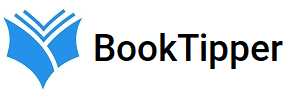
THE MAN WHO RAN WASHINGTON
by Peter Baker & Susan Glasser
From two of America’s most revered political journalists comes the definitive biography of legendary White House chief of staff and secretary of state James A. Baker III: the man who ran Washington when Washington ran the world.
For a quarter-century, from the end of Watergate to the aftermath of the Cold War, no Republican won the presidency without his help or ran the White House without his advice. James Addison Baker III was the indispensable man for four presidents because he understood better than anyone how to make Washington work at a time when America was shaping events around the world. The Man Who Ran Washington is a page-turning portrait of a power broker who influenced America’s destiny for generations.
A scion of Texas aristocracy who became George H. W. Bush’s best friend on the tennis courts of the Houston Country Club, Baker had never even worked in Washington until a devastating family tragedy struck when he was thirty-nine. Within a few years, he was leading Gerald Ford’s campaign and would go on to manage a total of five presidential races and win a sixth for George W. Bush in a Florida recount. He ran Ronald Reagan’s White House and became the most consequential secretary of state since Henry Kissinger. He negotiated with Democrats at home and Soviets abroad, rewrote the tax code, assembled the coalition that won the Gulf War, brokered the reunification of Germany and helped bring a decades-long nuclear superpower standoff to an end. Ruthlessly partisan during campaign season, Baker governed as the avatar of pragmatism over purity and deal-making over division, a lost art in today’s fractured nation.
His story is a case study in the acquisition, exercise, and preservation of power in late twentieth-century America and the story of Washington and the world in the modern era–how it once worked and how it has transformed into an era of gridlock and polarization. This masterly biography by two brilliant observers of the American political scene is destined to become a classic.

HIS VERY BEST
by Jonathan Alter
From one of America’s most-respected journalists and modern historians comes the first full-length biography of Jimmy Carter, the thirty-ninth president of the United States and Nobel Prize–winning humanitarian.
Jonathan Alter tells the epic story of an enigmatic man of faith and his improbable journey from barefoot boy to global icon. Alter paints an intimate and surprising portrait of the only president since Thomas Jefferson who can fairly be called a Renaissance Man, a complex figure—ridiculed and later revered—with a piercing intelligence, prickly intensity, and biting wit beneath the patented smile. Here is a moral exemplar for our times, a flawed but underrated president of decency and vision who was committed to telling the truth to the American people.
Growing up in one of the meanest counties in the Jim Crow South, Carter is the only American president who essentially lived in three centuries: his early life on the farm in the 1920s without electricity or running water might as well have been in the nineteenth; his presidency put him at the center of major events in the twentieth; and his efforts on conflict resolution and global health set him on the cutting edge of the challenges of the twenty-first.
Drawing on fresh archival material and five years of extensive access to Carter and his entire family, Alter traces how he evolved from a timid, bookish child—raised mostly by a black woman farmhand—into an ambitious naval nuclear engineer writing passionate, never-before-published love letters from sea to his wife and full partner, Rosalynn; a peanut farmer and civic leader whose guilt over staying silent during the civil rights movement and not confronting the white terrorism around him helped power his quest for racial justice at home and abroad; an obscure, born-again governor whose brilliant 1976 campaign demolished the racist wing of the Democratic Party and took him from zero percent to the presidency; a stubborn outsider who failed politically amid the bad economy of the 1970s and the seizure of American hostages in Iran but succeeded in engineering peace between Israel and Egypt, amassing a historic environmental record, moving the government from tokenism to diversity, setting a new global standard for human rights, and normalizing relations with China among other unheralded and far-sighted achievements. After leaving office, Carter eradicated diseases, built houses for the poor, and taught Sunday school into his mid-nineties.
This engrossing, monumental biography will change our understanding of perhaps the most misunderstood president in American history.
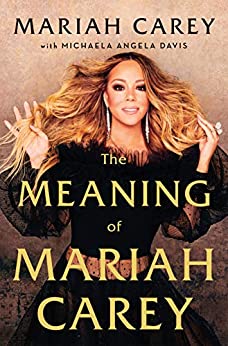
THE MEANING OF MARIAH CAREY
by Mariah Carey
The global icon, award-winning singer, songwriter, producer, actress, mother, daughter, sister, storyteller, and artist finally tells the unfiltered story of her life in The Meaning of Mariah Carey
It took me a lifetime to have the courage and the clarity to write my memoir. I want to tell the story of the moments – the ups and downs, the triumphs and traumas, the debacles and the dreams, that contributed to the person I am today. Though there have been countless stories about me throughout my career and very public personal life, it’s been impossible to communicate the complexities and depths of my experience in any single magazine article or a ten-minute television interview. And even then, my words were filtered through someone else’s lens, largely satisfying someone else’s assignment to define me.
This book is composed of my memories, my mishaps, my struggles, my survival and my songs. Unfiltered. I went deep into my childhood and gave the scared little girl inside of me a big voice. I let the abandoned and ambitious adolescent have her say, and the betrayed and triumphant woman I became tell her side.
Writing this memoir was incredibly hard, humbling and healing. My sincere hope is that you are moved to a new understanding, not only about me, but also about the resilience of the human spirit.
Love,
Mariah

WHERE LAW ENDS: INSIDE THE MUELLER INVESTIGATION
by Andrew Weissmann
In the first and only inside account of the Mueller investigation, one of the special counsel’s most trusted prosecutors breaks his silence on the team’s history-making search for the truth, their painstaking deliberations and costly mistakes, and Trump’s unprecedented efforts to stifle their report.
“WHERE LAW ENDS TYRANNY BEGINS”—John Locke, inscribed on the wall of DOJ headquarters in Washington, D.C.
In May 2017, Robert Mueller was tapped to lead an inquiry into Russian interference in the 2016 presidential election, coordination by foreign agents with Donald Trump’s campaign, and obstruction of justice by the president. Mueller assembled a “dream team” of top prosecutors, and for the next twenty-two months, the investigation was a black box and the subject of endless anticipation and speculation—until April 2019, when the special counsel’s report was released.
In Where Law Ends, legendary prosecutor Andrew Weissmann—a key player in the Special Counsel’s Office—finally pulls back the curtain to reveal exactly what went on inside the investigation, including the heated debates, painful deliberations, and mistakes of the team—not to mention the external efforts by the president and Attorney General William Barr to manipulate the investigation to their political ends.
Weissmann puts the reader in the room as Mueller’s team made their most consequential decisions, such as whether to subpoena the president, whether to conduct a full financial investigation of Trump, and whether to explicitly recommend obstruction charges against him. Weissmann also details for the first time the debilitating effects that President Trump himself had on the investigation, through his dangling of pardons and his constant threats to shut down the inquiry and fire Mueller, which left the team racing against the clock and essentially fighting with one hand tied behind their backs.
In Where Law Ends, Weissmann conjures the camaraderie and esprit de corps of the investigative units led by the enigmatic Mueller, a distinguished public servant who is revealed here, in a way we have never seen him before, as a manager, a colleague, and a very human presence. Weissmann is as candid about the team’s mistakes as he is about its successes, and is committed to accurately documenting the historic investigation for future generations to assess and learn from. Ultimately, Where Law Ends is a story about a team of public servants, dedicated to the rule of law, tasked with investigating a president who did everything he could to stand in their way.
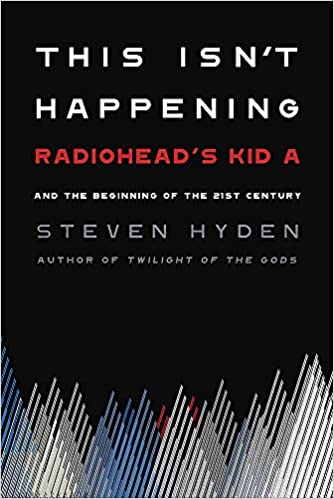
THIS ISN'T HAPPENING
by Steven Hyden
The making and meaning of Radiohead’s groundbreaking, controversial, epoch-defining album, Kid A.
In 1999, as the end of an old century loomed, five musicians entered a recording studio in Paris without a deadline. Their band was widely recognized as the best and most forward-thinking in rock, a rarefied status granting them the time, money, and space to make a masterpiece. But Radiohead didn’t want to make another rock record. Instead, they set out to create the future.
For more than a year, they battled writer’s block, inter-band disagreements, and crippling self-doubt. In the end, however, they produced an album that was not only a complete departure from their prior guitar-based rock sound, it was the sound of a new era, and embodied widespread changes catalyzed by emerging technologies just beginning to take hold of the culture.
What they created was Kid A. At the time, Radiohead’s fourth album divided critics. Some called it an instant classic; others, including the U.K. music magazine Melody Maker, deemed it “tubby, ostentatious, self-congratulatory . . . whiny old rubbish.” But two decades later, Kid A sounds like nothing less than an overture for the chaos and confusion of the twenty-first century.
Acclaimed rock critic Steven Hyden digs deep into the songs, history, legacy, and mystique of Kid A, outlining the album’s pervasive influence and impact on culture, in time for its 20th anniversary. Deploying a mix of criticism, journalism, and personal memoir, Hyden skillfully revisits this enigmatic, alluring LP and investigates the many ways in which Kid A shaped and foreshadowed our world.
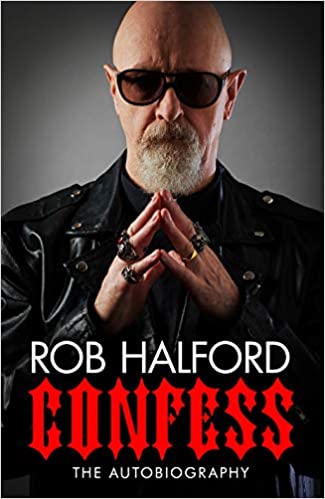
CONFESS
by Rob Halford
The legendary frontman of Judas Priest, one of the most successful heavy metal bands of all time, celebrates five decades of heavy metal in this tell-all memoir.
Most priests hear confessions. This one is making his.
Rob Halford, front man of global iconic metal band Judas Priest, is a true “Metal God.” Raised in Britain’s hard-working, heavy industrial heartland, he and his music were forged in the Black Country. Confess, his full autobiography, is an unforgettable rock ‘n’ roll story-a journey from a Walsall council estate to musical fame via alcoholism, addiction, police cells, ill-fated sexual trysts, and bleak personal tragedy, through to rehab, coming out, redemption . . . and finding love.
Now, he is telling his gospel truth.
Told with Halford’s trademark self-deprecating, deadpan Black Country humor, Confess is the story of an extraordinary five decades in the music industry. It is also the tale of unlikely encounters with everybody from Superman to Andy Warhol, Madonna, Jack Nicholson, and the Queen. More than anything else, it’s a celebration of the fire and power of heavy metal.
Rob Halford has decided to Confess. Because it’s good for the soul.
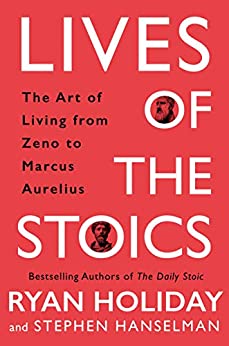
LIVES OF THE STOICS
by Ryan Holiday & Stephen Hanselman
From the bestselling authors of The Daily Stoic comes an inspiring guide to the lives of the Stoics, and what the ancients can teach us about happiness, success, resilience and virtue.
Nearly 2,300 years after a ruined merchant named Zeno first established a school on the Stoa Poikile of Athens, Stoicism has found a new audience among those who seek greatness, from athletes to politicians and everyone in between. It’s no wonder; the philosophy and its embrace of self-mastery, virtue, and indifference to that which we cannot control is as urgent today as it was in the chaos of the Roman Empire. In Lives of the Stoics, Holiday and Hanselman present the fascinating lives of the men and women who strove to live by the timeless Stoic virtues of Courage. Justice. Temperance. Wisdom. Organized in digestible, mini-biographies of all the well-known–and not so well-known–Stoics, this book vividly brings home what Stoicism was like for the people who loved it and lived it, dusting off powerful lessons to be learned from their struggles and successes. More than a mere history book, every example in these pages, from Epictetus to Marcus Aurelius–slaves to emperors–is designed to help the reader apply philosophy in their own lives. Holiday and Hanselman unveil the core values and ideas that unite figures from Seneca to Cato to Cicero across the centuries. Among them are the idea that self-rule is the greatest empire, that character is fate; how Stoics benefit from preparing not only for success, but failure; and learn to love, not merely accept, the hand they are dealt in life. A treasure of valuable insights and stories, this book can be visited again and again by any reader in search of inspiration from the past.
Still Hot in Non-Fiction & Biography

CASTE: THE ORIGINS OF OUR DISCONTENTS
by Isabel Wilkerson
NEW YORK TIMES BESTSELLER • OPRAH’S BOOK CLUB PICK • The Pulitzer Prize–winning, bestselling author of The Warmth of Other Suns examines the unspoken caste system that has shaped America and shows how our lives today are still defined by a hierarchy of human divisions.
LONGLISTED FOR THE NATIONAL BOOK AWARD • “An instant American classic.”—Dwight Garner, The New York Times
“As we go about our daily lives, caste is the wordless usher in a darkened theater, flashlight cast down in the aisles, guiding us to our assigned seats for a performance. The hierarchy of caste is not about feelings or morality. It is about power—which groups have it and which do not.”
In this brilliant book, Isabel Wilkerson gives us a masterful portrait of an unseen phenomenon in America as she explores, through an immersive, deeply researched narrative and stories about real people, how America today and throughout its history has been shaped by a hidden caste system, a rigid hierarchy of human rankings.
Beyond race, class, or other factors, there is a powerful caste system that influences people’s lives and behavior and the nation’s fate. Linking the caste systems of America, India, and Nazi Germany, Wilkerson explores eight pillars that underlie caste systems across civilizations, including divine will, bloodlines, stigma, and more. Using riveting stories about people—including Martin Luther King, Jr., baseball’s Satchel Paige, a single father and his toddler son, Wilkerson herself, and many others—she shows the ways that the insidious undertow of caste is experienced every day. She documents how the Nazis studied the racial systems in America to plan their out-cast of the Jews; she discusses why the cruel logic of caste requires that there be a bottom rung for those in the middle to measure themselves against; she writes about the surprising health costs of caste, in depression and life expectancy, and the effects of this hierarchy on our culture and politics. Finally, she points forward to ways America can move beyond the artificial and destructive separations of human divisions, toward hope in our common humanity.
Beautifully written, original, and revealing, Caste: The Origins of Our Discontents is an eye-opening story of people and history, and a reexamination of what lies under the surface of ordinary lives and of American life today.

EAT A PEACH
by David Chang
NEW YORK TIMES BESTSELLER • From the chef behind Momofuku and star of Netflix’s Ugly Delicious—an intimate account of the making of a chef, the story of the modern restaurant world that he helped shape, and how he discovered that success can be much harder to understand than failure.
“David puts words to so many of the things we all feel, sharing generously of his own journey so we can all benefit in the process.”—Chrissy Teigen
In 2004, Momofuku Noodle Bar opened in a tiny, stark space in Manhattan’s East Village. Its young chef-owner, David Chang, worked the line, serving ramen and pork buns to a mix of fellow restaurant cooks and confused diners whose idea of ramen was instant noodles in Styrofoam cups. It would have been impossible to know it at the time—and certainly Chang would have bet against himself—but he, who had failed at almost every endeavor in his life, was about to become one of the most influential chefs of his generation, driven by the question, “What if the underground could become the mainstream?”
Chang grew up the youngest son of a deeply religious Korean American family in Virginia. Graduating college aimless and depressed, he fled the States for Japan, hoping to find some sense of belonging. While teaching English in a backwater town, he experienced the highs of his first full-blown manic episode, and began to think that the cooking and sharing of food could give him both purpose and agency in his life.
Full of grace, candor, grit, and humor, Eat a Peach chronicles Chang’s switchback path. He lays bare his mistakes and wonders about his extraordinary luck as he recounts the improbable series of events that led him to the top of his profession. He wrestles with his lifelong feelings of otherness and inadequacy, explores the mental illness that almost killed him, and finds hope in the shared value of deliciousness. Along the way, Chang gives us a penetrating look at restaurant life, in which he balances his deep love for the kitchen with unflinching honesty about the industry’s history of brutishness and its uncertain future.
